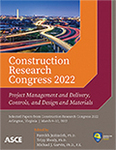Linear Optimization Model for Scheduling Repetitive Construction Projects with Multiple Crews
Publication: Construction Research Congress 2022
ABSTRACT
This study presents the development of a linear optimization model for scheduling repetitive construction projects with varying quantities of work at repetitive units to minimize project total cost. The model is capable of identifying the optimal order of executing repetitive units and considering multiple construction crews with different productivity rates. This model is developed in three main steps: (1) identifying input data; (2) formulating optimization model by identifying decision variables, formulating objective functions and constraints, and executing model computations; and (3) generating project schedule by quantifying work interruptions and cost; and identifying order of executing repetitive units for each crew. The model is designed to calculate project total cost based on direct and indirect costs. One example from the literature is analyzed to demonstrate the model capabilities and illustrate its use. The model results showed shorter project duration and cost compared to existing solutions in the literature. The model performance is verified by solving two demonstration examples from the literatures. The present model is expected to support project planners by enabling them to minimize project total cost.
Get full access to this article
View all available purchase options and get full access to this chapter.
REFERENCES
Altuwaim, A., and El-Rayes, K. (2018). Optimizing the Scheduling of Repetitive Construction to Minimize Interruption Cost. Journal of Construction Engineering and Management, 144(7), 4018051.
Ammar, M. A. (2013). LOB and CPM Integrated Method for Scheduling Repetitive Projects. Journal of Construction Engineering and Management, 139(1), 44–50. https://doi.org/10.1061/(ASCE)CO.1943-7862.0000569.
Ammar, M. A. (2019). Resource optimisation in line of balance scheduling. Construction Management and Economics, 1–11.
Ammar, M. A., and Elbeltagi, E. (2001). Algorithm for determining controlling path considering resource continuity. Journal of Computing in Civil Engineering, 15(4), 292–298.
Biruk, S., and Jaśkowski, P. (2017). Scheduling linear construction projects with constraints on resource availability. Archives of Civil Engineering, 63(1), 3–15.
Bożejko, W., Hejducki, Z., Uchroński, M., and Wodecki, M. (2014). Solving resource-constrained construction scheduling problems with overlaps by metaheuristic. Journal of Civil Engineering and Management, 20(5), 649–659.
El-Rayes, K., and Moselhi, O. (1998). Resource-driven scheduling of repetitive activities. Construction Management and Economics, 16(4), 433–446. https://doi.org/10.1080/014461998372213.
Hassan, A., and El-Rayes, K. (2020). Quantifying the interruption impact of activity delays in non-serial repetitive construction projects. Construction Management and Economics, 38(6), 515–533.
Liu, S.-S., and Wang, C.-J. (2007). Optimization model for resource assignment problems of linear construction projects. Automation in Construction, 16(4), 460–473. https://doi.org/10.1016/j.autcon.2006.08.004.
Matini, N., Tabatabaee, N., and Abbasghorbani, M. (2018). Protocol for FWD data collection at network-level pavement management in iran. Transportation Research Record, 2672(40), 68–77.
Monghasemi, S., and Abdallah, M. (2021). Linear Optimization Model to Minimize Total Cost of Repetitive Construction Projects and Identify Order of Units. Journal of Management in Engineering, 37(4), 4021036.
Monghasemi, S., Moatassem, A., and Clevenger, C. (2020). Linear Scheduling Optimization Model for Planning Repetitive Construction Projects. Construction Research Congress.
Niroumand, R., Bahrami, S., Aashtiani, H. Z., and Roorda, M. J. (2018). Battery Electric Vehicles Network Equilibrium with Flow-Dependent Energy Consumption.
Niroumand, R., Tajalli, M., Hajibabai, L., and Hajbabaie, A. (2020). The Effects of the “White Phase” on Intersection Performance with Mixed-Autonomy Traffic Stream. 2020 IEEE 23rd International Conference on Intelligent Transportation Systems (ITSC), 1–6.
Podolski, M., and Sroka, B. (2019). Cost optimization of multiunit construction projects using linear programming and metaheuristic-based simulated annealing algorithm. Journal of Civil Engineering and Management, 25(8), 848–857.
Tran, D.-H., Chou, J.-S., and Luong, D.-L. (2020). Optimizing non-unit repetitive project resource and scheduling by evolutionary algorithms. Operational Research, 1–27.
Zou, X., Fang, S.-C., Huang, Y.-S., and Zhang, L.-H. (2016). Mixed-integer linear programming approach for scheduling repetitive projects with time-cost trade-off consideration. Journal of Computing in Civil Engineering, 31(3), 6016003.
Zou, X., and Zhang, L. (2020). A constraint programming approach for scheduling repetitive projects with atypical activities considering soft logic. Automation in Construction, 109, 102990. https://doi.org/10.1016/J.AUTCON.2019.102990.
Zou, X., Zhang, L., and Zhang, Q. (2018a). A biobjective optimization model for deadline satisfaction in line-of-balance scheduling with work interruptions consideration. Mathematical Problems in Engineering, 2018.
Zou, X., Zhang, Q., and Zhang, L. (2018b). Modeling and solving the deadline satisfaction problem in line-of-balance scheduling. Journal of Management in Engineering, 34(1), 4017044.
Information & Authors
Information
Published In
History
Published online: Mar 7, 2022
Authors
Metrics & Citations
Metrics
Citations
Download citation
If you have the appropriate software installed, you can download article citation data to the citation manager of your choice. Simply select your manager software from the list below and click Download.
